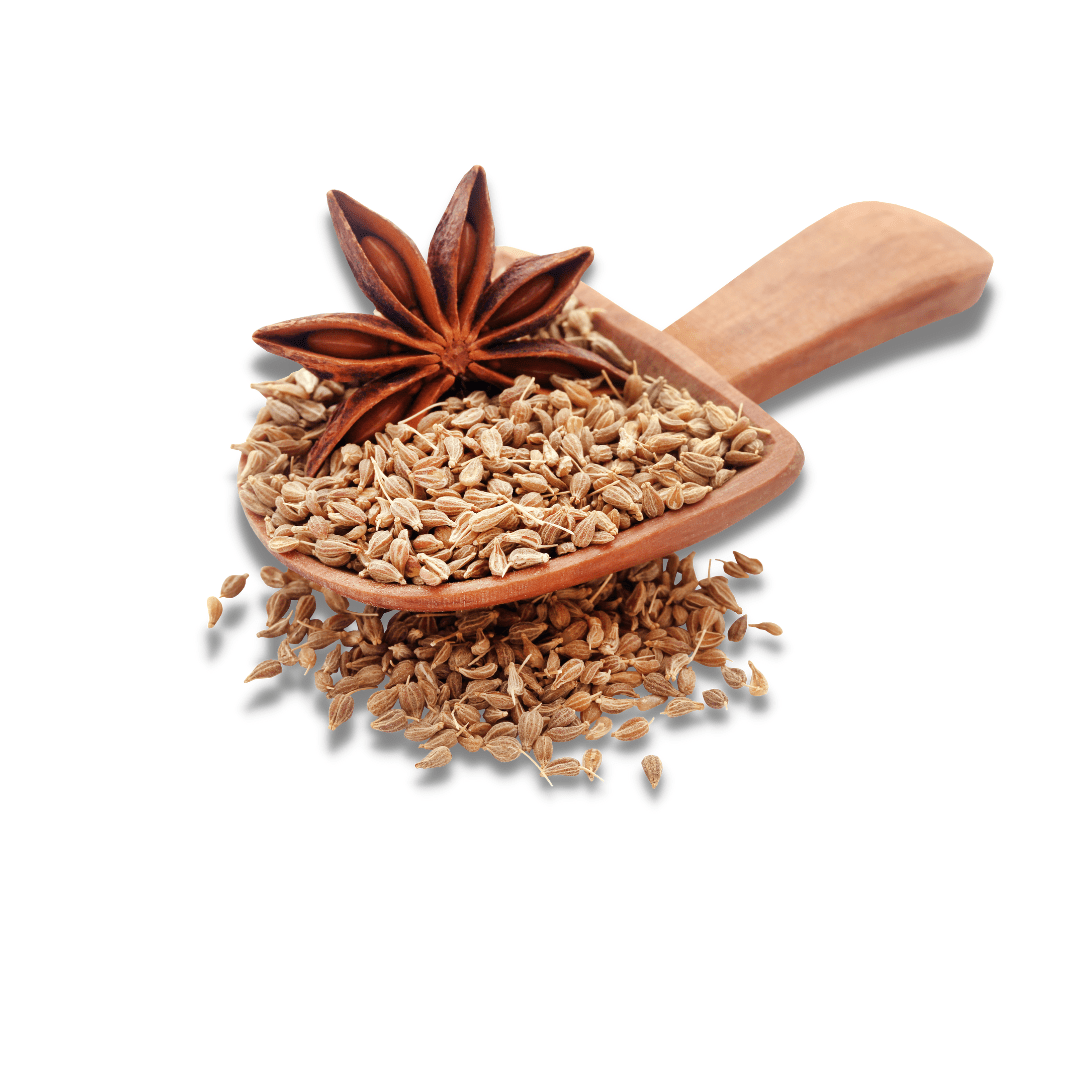About
Anise, also known as aniseed, is a spice that is commonly used in Mediterranean, Middle Eastern, and Asian cuisines. It has a sweet, licorice-like flavor and is often used in baked goods, beverages, and savory dishes.
Health Benefits of Anise:
-
Digestive Aid: Anise is known for its digestive properties and can help relieve indigestion, bloating, and flatulence.
-
Respiratory Health: Anise can help alleviate respiratory issues such as coughs, colds, and asthma.
-
Anti-inflammatory: Anise has anti-inflammatory properties that can help reduce inflammation in the body and alleviate pain.
-
Antimicrobial: Anise has antimicrobial properties that can help fight against bacteria, viruses, and fungi.
-
Hormonal Health: Anise can help regulate hormonal imbalances and alleviate menstrual cramps.
List of diseases that can be cured by Anise:
- Indigestion
- Bloating
- Flatulence
- Respiratory Issues
- Inflammation
- Hormonal Imbalances
Energy content in 50 grams of Anise: 172 kcal
Macronutrient content in 50 grams of Anise:
| Nutrient | Amount |
|---|---|
| Carbohydrate | 35.8 g |
| Fat | 3.4 g |
| Protein | 6.6 g |
| Fiber | 14.6 g |
| Water | 1.7 g |
Vitamin content in 50 grams of Anise:
| Vitamin | Amount |
|---|---|
| Vitamin A | 29.5 mcg |
| Vitamin B1 | 0.2 mg |
| Vitamin B2 | 0.1 mg |
| Vitamin B3 | 1.1 mg |
| Vitamin B6 | 0.1 mg |
| Vitamin B12 | 0 mcg |
| Vitamin C | 10.1 mg |
| Vitamin D | 0 mcg |
| Vitamin E | 0.6 mg |
| Vitamin K | 22.8 mcg |
| Folate | 44.5 mcg |
| Biotin | 0.1 mcg |
Mineral content in 50 grams of Anise:
| Mineral | Amount |
|---|---|
| Calcium | 432 mg |
| Iron | 8.2 mg |
| Iodine | 0 mcg |
| Zinc | 1.3 mg |
| Magnesium | 46.6 mg |
| Phosphorus | 111 mg |
| Potassium | 636 mg |
| Sodium | 21 mg |
| Chloride | 0 mg |
| Copper | 0.2 mg |
| Chromium | 0 mcg |
| Fluoride | 0 mcg |
| Molybdenum | 0 mcg |
| Manganese | 0.3 mg |
| Selenium | 1.2 mcg |
What is anise?
Anise is a flowering plant native to the Mediterranean region and Southwest Asia. It is known for its aromatic seeds and distinct licorice-like flavor.
What are the health benefits of consuming anise?
Anise is believed to aid digestion, relieve bloating and gas, promote respiratory health, and have antibacterial properties. It may also help improve sleep and support hormonal balance.
How can I use anise in cooking?
Anise seeds can be used in both sweet and savory dishes, including baked goods, soups, stews, and beverages. They add a unique flavor and aroma to recipes.
Are there any potential side effects of consuming anise?
In general, anise is considered safe for most people when consumed in moderation. However, some individuals may be allergic to anise or experience mild digestive discomfort if consumed in excessive amounts.
Where can I buy anise seeds?
Anise seeds are commonly available in grocery stores, spice shops, and online retailers. They can be purchased in whole or ground form.
Can anise be used as a natural remedy for digestive issues?
Yes, anise has been traditionally used to support digestive health and alleviate symptoms such as indigestion, bloating, and stomach cramps.
Does anise have any culinary significance in Mediterranean cuisine?
Anise is a popular ingredient in Mediterranean dishes, particularly in Greek, Italian, and Middle Eastern cuisines. It is often used in desserts, liqueurs, and savory dishes.
Can anise be used to enhance the flavor of teas and beverages?
Yes, anise seeds are commonly used to infuse flavor into teas, herbal blends, and alcoholic beverages like ouzo and absinthe.
How should anise be stored to maintain its freshness?
It is best to store anise seeds in an airtight container in a cool, dark place to preserve their flavor and aroma. Ground anise should be used within six months for optimal freshness.
Can anise be used during pregnancy?
Pregnant women should consult with their healthcare provider before consuming anise or any herbal products to ensure it is safe for them.
oes anise have any sedative properties?
Anise is believed to have mild sedative effects and may help promote relaxation and sleep. However, it is not a substitute for medical advice or treatment for sleep disorders.
Can anise seeds be used as a natural breath freshener?
Yes, chewing on anise seeds or using anise-based mouthwashes can help freshen breath and mask unpleasant odors.
Can anise be used to relieve cough and congestion?
Anise has expectorant properties and is commonly used to alleviate cough and congestion. It is often found in cough syrups and throat lozenges.
Is anise suitable for individuals with gluten intolerance or celiac disease?
Anise itself does not contain gluten and is considered safe for individuals with gluten intolerance or celiac disease. However, cross-contamination is possible, so it's important to check labels for potential gluten-containing additives.



